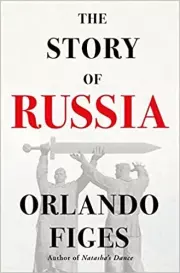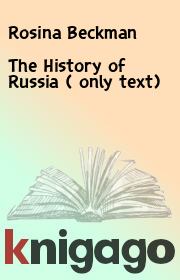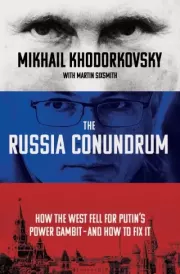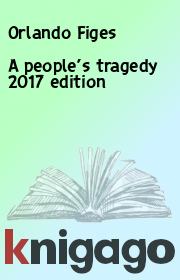Orlando Figes - The Story of Russia
 | Название: | The Story of Russia |
Автор: | Orlando Figes | |
Жанр: | Старинная литература | |
Изадано в серии: | неизвестно | |
Издательство: | неизвестно | |
Год издания: | 2022 | |
ISBN: | неизвестно | |
Отзывы: | Комментировать | |
Рейтинг: | ||
Поделись книгой с друзьями! Помощь сайту: донат на оплату сервера | ||
Краткое содержание книги "The Story of Russia"
“This is the essential backstory, the history book that you need if you want to understand modern Russia and its wars with Ukraine, with its neighbors, with America, and with the West.” ―Anne Applebaum, author of Twilight of Democracy and Red Famine Named a Most Anticipated Book of the Year by Publishers Weekly and Kirkus Reviews From “the great storyteller of Russian history” (Financial Times), a brilliant account of the national mythologies and imperial ideologies that have shaped Russia’s past and politics―essential reading for understanding the country today The Story of Russia is a fresh approach to the thousand years of Russia’s history, concerned as much with the ideas that have shaped how Russians think about their past as it is with the events and personalities comprising it. No other country has reimagined its own story so often, in a perpetual effort to stay in step with the shifts of ruling ideologies. From the founding of Kievan Rus in the first millennium to Putin’s war against Ukraine, Orlando Figes explores the ideas that have guided Russia’s actions throughout its long and troubled existence. Whether he's describing the crowning of Ivan the Terrible in a candlelit cathedral or the dramatic upheaval of the peasant revolution, he reveals the impulses, often unappreciated or misunderstood by foreigners, that have driven Russian history: the medieval myth of Mother Russia’s holy mission to the world; the imperial tendency toward autocratic rule; the popular belief in a paternal tsar dispensing truth and justice; the cult of sacrifice rooted in the idea of the “Russian soul”; and always, the nationalist myth of Russia’s unjust treatment by the West. How the Russians came to tell their story and to revise it so often as they went along is not only a vital aspect of their history; it is also our best means of understanding how the country thinks and acts today. Based on a lifetime of scholarship and enthrallingly written, The Story of Russia is quintessential Figes: sweeping, revelatory, and masterful.
Читаем онлайн "The Story of Russia". [Страница - 4]
The Primary Chronicle reads more like a fairy tale than a work of history. It is a typical foundation myth – composed to establish the political legitimacy of the Riurikids, the Kievan ruling dynasty, as God’s chosen agents for the Christianisation of the Rus lands. Much of it is fictional – stories patched together from orally transmitted epic songs and narrative poems (known in Russian as byliny), Norse sagas, Slav folklore, old Byzantine annals and religious texts. Nothing in it can be taken as a fact. We cannot say for sure whether Riurik even existed. He may have been Rörik, the nephew, son or possibly the brother of the Danish monarch Harald Klak, who was alive at the right time. But there is no evidence connecting him to Kiev, so the founder of the dynasty may have been a different Viking warrior, or an allegorical figure.3 The Kievan monks were less concerned with the accuracy of their chronicle than with its religious symbolism and meaning. The timescale of the chronicle is biblical. It charts the history of the Rus from Noah in the Book of Genesis, claiming them to be the descendants of his son Japheth, so that Kievan Rus is understood to have been created as part of the divine plan.4
The Primary Chronicle was at the heart of a debate on Russia’s origins that goes back to the first half of the eighteenth century, when history-writing in Russia was in its infancy. The new academic discipline was dominated by Germans. Among them was Gerhard Friedrich Müller (1705–83), who at the age of twenty had joined the teaching staff of the newly founded St Petersburg Academy of Sciences. Müller was the founding editor of the first series of documents and articles on Russian history, the Sammlung Russischer Geschichte (1732–65), published in German to inform a European readership, which knew almost nothing about Russia and its history. The peak of his career came in 1749, when he was tasked with giving an oration for the Empress Elizabeth on her name day. His lecture was entitled ‘On the Origins of the Russian People and their Name’.
In it Müller summarised the findings of other German scholars, who had concluded from their reading of the Primary Chronicle that Russia owed its origins to the Vikings. The Rus, he said, were Scandinavians, whose tribal name derived from Ruotsi, a term used by the Finns to describe the Swedes from Roslagen. But this was not the moment to suggest that Russia was created by the Swedes, or any other foreigners. Russia’s victory in the recent war against Sweden (1741–3) had bolstered patriotic sentiments, which extended to the country’s past. Müller’s lecture was roundly criticised at the Academy. A scrutiny committee was appointed to decide whether it could be delivered – if not on the empress’s name day on 5 September then on the seventh anniversary of her coronation on 25 November – without bringing Russia ‘into disrepute’. Mikhail Lomonosov, Russia’s first great polymath, led the attack on the German, accusing him of setting out to denigrate the Slavs by depicting them as savages, incapable of organising themselves as a state. The Rus, he insisted, were not Swedes but Baltic Slavs, descendants of the Iranian Roxolani tribe, whose history went back to the Trojan Wars. National pride coloured Lomonosov’s criticisms, along with a personal dislike of the German. He wrongly claimed that Müller was unable to read Russian documents, that he made gross errors as a consequence and that, like all foreigners, he could not really know the country’s history because he was not Russian.
Six months of academic arguments ensued. On 8 March 1750, the scrutiny committee banned Müller’s lecture and confiscated all the printed copies of it in both Russian and Latin. Lomonosov took part in the raid. The German was demoted to a junior post and barred from working in the state archive, supposedly to defend the Russian Empire from his attempts to ‘besmirch’ its history. Müller’s academic career never fully recovered, but he published many books, including Origines gentis et nominis Russorum (1761), which developed the ideas of his lecture. Published first in Germany, Origines did not appear in Russian until 1773, a decade after Lomonosov’s Ancient Russian History, a book written as a refutation of Müller’s argument.5
The debate on Russia’s origins has continued to this day. Known as the Normanist Controversy (because the Vikings were Normans), it is highly charged with politics and ideology. The question at its heart is whether Russia was created by the Russians or by foreigners.
In the final decades of the eighteenth century, Müller’s ‘Norman theory’ gained acceptance in the St Petersburg Academy, where German-born historians were dominant. They propagated the theory that Riurik had belonged to a Germanic tribe of Scandinavia and that Russia as a state and culture had thus been founded by Germans. Catherine the Great (herself German-born) supported their position, because it suggested that the Russians were of European stock, a viewpoint she promoted in her many works. In German hands the Normanist position entailed sometimes racist attitudes towards the Slavs. Typical is this passage from a study of the Primary Chronicle by August Ludwig von Schlözer in 1802:
Of course there were people there [in Russia], God knows for how long and from where they came, but they were people without any leadership, living like wild beasts and birds in their vast forests … No enlightened European had noticed them or had written about them. There was not a single real town in the whole of the North … Wild, boorish and isolated Slavs began to be socially acceptable only thanks to the Germans, whose mission, decreed by fate, was to sow the first seeds of civilization among them.6
The Norman theory appealed to defenders of autocracy, supposing as it did that the warring Slavic tribes were incapable of governing themselves. Foremost among them was Nikolai Karamzin, Russia’s first great writer and historian, who leaned heavily on Schlözer’s work in his History of the Russian State (published in twelve volumes between 1818 and 1829). Before the establishment of foreign princely rule, Karamzin declared, Russia had been nothing but an ‘empty space’ with ‘wild and warring tribes, living on a level with the beasts and birds’.7
These views were challenged in the nineteenth century by philologists and archaeologists. Often motivated by nationalist pride in Russia’s ancient Slav culture, they looked for evidence that underlined its advanced social life in the first millennium. The anti-Normanists, as they were called, argued that the Rus were not from Scandinavia (they were not mentioned in the Old Norse sources or sagas) but were Slavs, whose name, they argued, had appeared in Greek sources from the second century and in Arab from the fifth. The Rus homeland, they maintained, was in Ukraine and was marked by Slavic river names (Ros, Rosava,
--">Книги схожие с «The Story of Russia» по жанру, серии, автору или названию:
 |
| Rosina Beckman - The History of Russia ( only text) Жанр: Старинная литература Год издания: 101 |
| Encyclopaedia Britannica - Russia Жанр: Старинная литература Год издания: 101 |
 |
| Mikhail Khodorkovsky-ua - The Russia Conundrum - Mikhail Khodorkovsky-ua Жанр: Старинная литература Год издания: 2022 |
 |
| Orlando Figes - A people's tragedy 2017 edition Жанр: Старинная литература Год издания: 101 |


